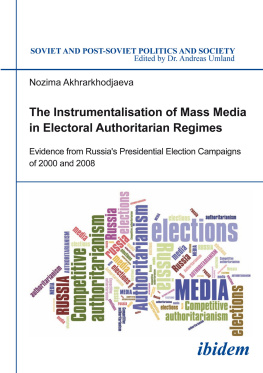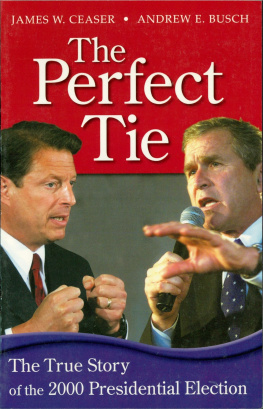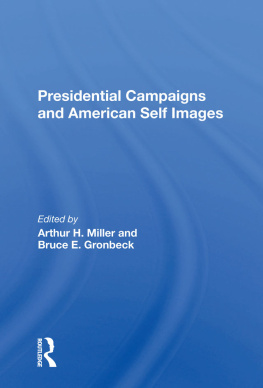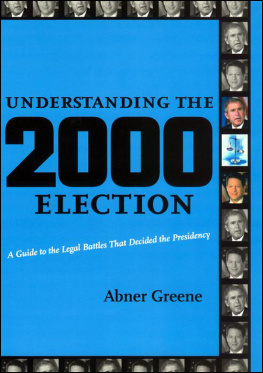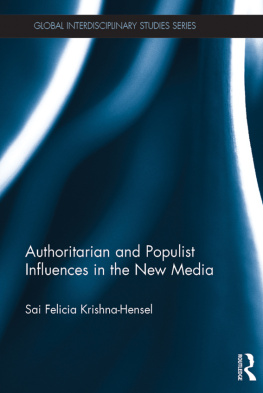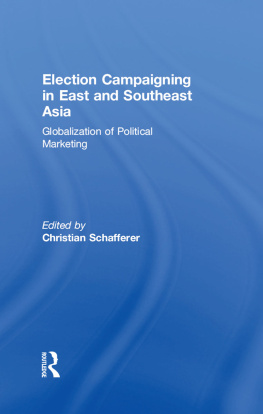Introduction
Research focus
Elections are assumed to empower people against authoritarian rule, bring about democratically elected government, and most importantly, serve as an instrument by which citizens hold the government accountable. However, despite the fact that most political systems in the twenty-first century hold at least some sort of elections, the same type of rulers appear to remain and rule in the same authoritarian fashion. Many authors (Lindberg 2009; McCoy and Hartlyn 2008; Brownlee 2009) claim that repeated elections can lead to democratisation . However, regardless of the regularity of elections in many authoritarian and semi-authoritarian regimes, incumbents use various tactics to manipulat e voters preferences or reduce the likelihood of opposition candidates being elected by changing electoral laws before election day (Birch 2011). One of the tools that leaders use to manipulate voters preferences is the media. In democracies, the medias main task is to inform citizens, provide balanced coverage of political events, render political authorities accountable by monitoring their activities, and serve as a marketplace of ideas (Voltmer 2007; Dahl 1975). However, in states with weak democratic institutions, the situation is somewhat different.
Based on a case study of Russian media, I explore the role played by media in electoral authoritarian regimes in general, and in two sub-types specifically, i.e., competitive authoritarian and hegemonic authoritarian regimes, from a comparative perspective. I aim to determine how control of media access hinders the ability of the opposition to win elections and to discover the means by which the incumbent government uses its administrative resources to win elections. Furthermore, I explore the types of manipulation strategies that are used during electoral campaigns. One of the main arguments of the work is that in competitive authoritarian regimes, the media are among the main instruments used by the state to influence voters choice and ensure regime stability.
Unlike fully authoritarian regimes, where democratic institutions either do not exist or exist only as a fa ade, in competitive authoritarian regimes, channels through which opposition can compete in executive elections do exist. In competitive authoritarian regimes, democratic procedures are sufficiently meaningful for opposition groups to take them seriously as arenas through which they can contest for power (Levitsky and Way 2010: 7). Rather than fully repressing the broadcasting media, competitive authoritarian regime governments prefer to use various strategies to influence reporting. Implementation of these strategies significantly reduces the opportunity for opposition forces to voice their views and opinions, let alone win elections. Mass media manipulation serves as an important instrument of regime stability. In other words, an in cumbent manipulates broadcast media channels to win elections and legitimise his electoral success. As a result, in such regimes, the manipulation of media broadcasting is widespread.
The main goal of this work is to explore the role media play in competitive and hegemonic authoritarian regimes. I aim to find out how control of access to the media hinders oppositions chances to win elections and figur e the strategies the incumbent government uses to manipulate media reporting. Furthermore, I am interested in types of manipulation strategies used during the electoral campaigns. One of the main arguments of the work is that media is one of the key instruments used by the state to i nfluence voters choice and thus to ensure regime stability in competitive authoritarian regimes.
Object of the study | The effects of media manipulation strategies that are used by the ruling elite on news media content in electoral authoritarian regimes. |
Research questions | How do the media manipulation strategies that are employed by the ruling elite in electoral authoritarian regimes affect news content? The question has four principal components: 1) Types and extent of med ia manipulation strategies; 2) M echanisms of influence; 3) M edia s reaction to the influence; and 4) Effects of these manipulations on news content. What are the core differences in terms of media manipulation strategies and their effects on media content in competitive and hegemonic regimes? |
Instrumentalisation of the media is best understood in the context of political and economic conditions. The principal issues discussed in this work involve the coping mechanisms of media companies, editors, and journalists in the changing political and economic environment; the interaction between the media, the state elite and the opposition; the financial and political considerations of the actors involved; the effects manipulation strategies have on news content or the information that the audience (i.e., voters) get; and finally, the effect that all these factors might have on election outcomes.
Placing relevant actors (i.e., the incumbent elite, opposition candidates, business elite, and the media ) in their context to see how their actions are constrained by structural and institutional factors that are not of their own making reveals insightful details, which have not yet been studied. The principal goal of this work is to identify and map media manipulation strategies and to understand the effects that this manipulation has on news content in electoral authoritarian regimes. Further, differences in media coverage between competitive and hegemonic authoritarian regimes are established .
Importance, relevance, and contribution to theory
A large body of literature exists on hybrid regimes _ (Zakaria 1997; Merkel 2004; O Donnell 2008; Schedler 2002; Ottaway 2003; Howard and Roessler 2006; Brownlee 2009; Levitsky and Way 2010), media effects (Lasswell 1935; Lazarsfeld, Berelson and Gaudet 1944; Klapper 1960; McQuail 1992; Marcuse 1964; Herman and Chomski 1988), electoral malpractices (Mozaffar and Schedler 2002; Birch 2007; 2011; Schedler 2002; 2013), and media systems (Siebert et al. 1956; Hallin and Mncini 2004; 2011). Many scholars have acknowledged the important role of media outlets during the colour revolutions that led to electoral change in several countries (McFaul 2005; Bunce and Wolchik 2006). There have even been studies of media systems in new democracies (Voltmer 2014) and studies of media effects on electoral outcomes in post-Soviet countries, mostly in relation to Russia (Enikolopov et al. 2011). However, systematic research on the role of the media in stabilising authoritarian rule in electoral autocracies has not yet been conducted. The key contribution s of this work to the literature consist of the following s :
a) Bridging the literature on hybrid regime studies and electoral malpractices
Literature on hybrid regimes has expanded in recent decades. The debate revolves around the conceptualisation, classification, and operationalisation of such regimes. The categories proposed by scholars including Levitsky and Way (2010), Jason Brownlee (2009), Howard and Roessler (2006), and Schedler (2013) are well defined, and on a conceptual level, do not raise serious disagreements. However, the operationalisation and measurement criteria they use are problematic. On the one hand, scholars do not agree about how to assign a type to a case , and on the other, their measurement criteria are sometimes arbitrary. I argue that existing quantitative measurements are not always sufficient to characterise the difference between various types of hybrid regimes. Therefore, I propose to examine the qualitative characteristics of regimes to improve operationalisation.

